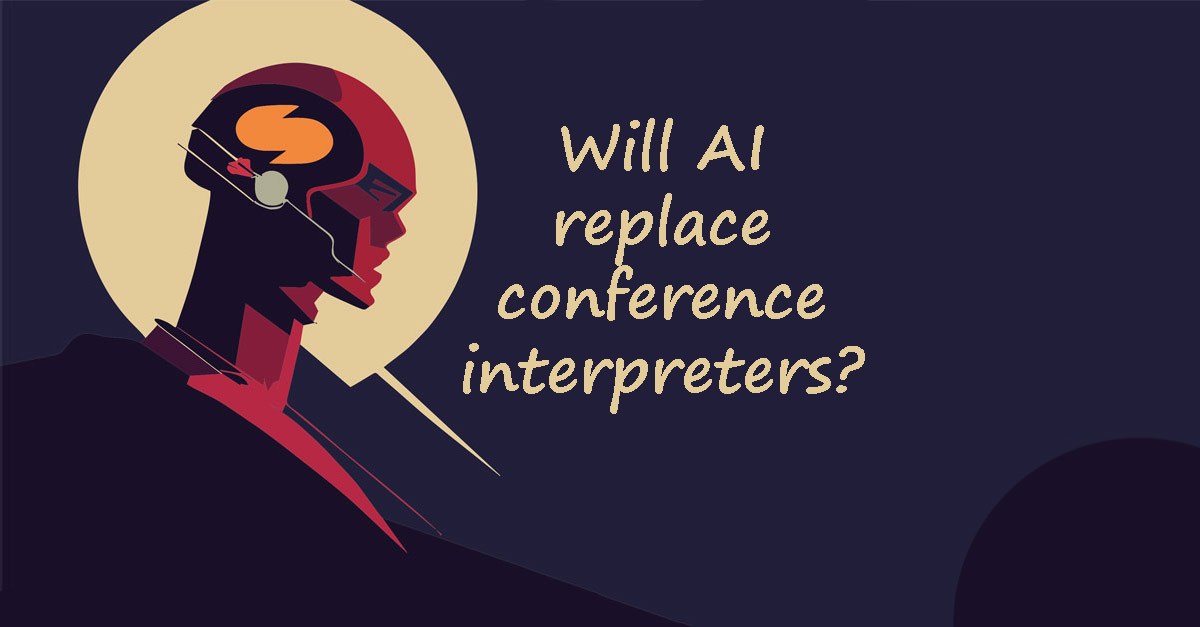Globish, AI, and interpreters. Will we be pushed out?
Interpreters’ raison d’être was already threatened by the slow but steady rise of ‘globish’. Now, interpreter jobs are seriously challenged by the explosive emergence this year of A.I. How much longer will interpreters be needed if everyone speaks English? How do current ‘artificial interpreters’ compare to human ones? Are there other threats out there? What can interpreters do? Is the profession doomed?
What is globish?
I only heard of this term recently, and it caught my attention because it explained why, in more and more events I work at, almost all speakers used English, regardless of their original language, country, and institutions, and sometimes completely at odds with the moderator’s question.
In a recent event, as I was interpreting the speaker, my teacher’s student-assessment-skills kicked in, and I came to realise the speaker was not comfortable in responding to prompts, yet produced nuanced and carefully created sentences. Overall, this person was a confident public speaker who could successfully engage their audience. The trick?
Globish is a name for a subset of the English language formalized in 2004 by Jean-Paul Nerrière.(“Don’t speak English, parlez Globish”) It uses a subset of standard English grammar and a list of 1500 English words. Wikipedia
As all languages, it also has its own cultural codes and social etiquette. In the context of conference interpreting, panelist deliver their response to prompts in a very formal format, in line with the latest trend in “soft skills”, “communication skills”, and “excutive coaching”:
Globish is a language I suppose, but its clearly not rich or flexible enough to survive “in the wild”. It’s English-redux, specifically geared for international communication, a neutral linguistic common ground for the world to talk to itself, a language with no location, no country, no home other than itself.
Yet this is clearly a tool for the greater good, as it enables direct communication between parties from around the world, a forum which hosts closer, more respectful dialogue leading to better practical results and (hopefully), better outcomes for our populations.
Has the use of globish reached levels high enough for event professionals to feel our services are not longer required?
ChatGpt copt out on the question: The response started with “As of my last knowledge update in January 2022, there was no widely recognized or reported threat to interpreters specifically due to the use of Globish”, so I turned to Ngram Viewer for figures:
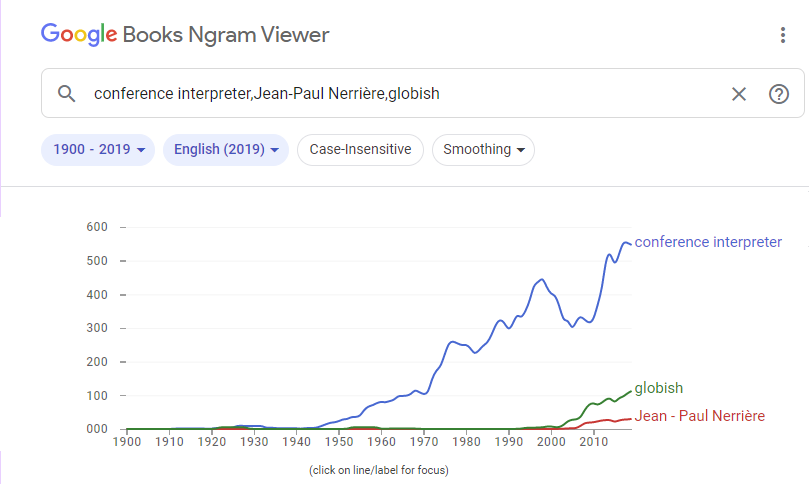
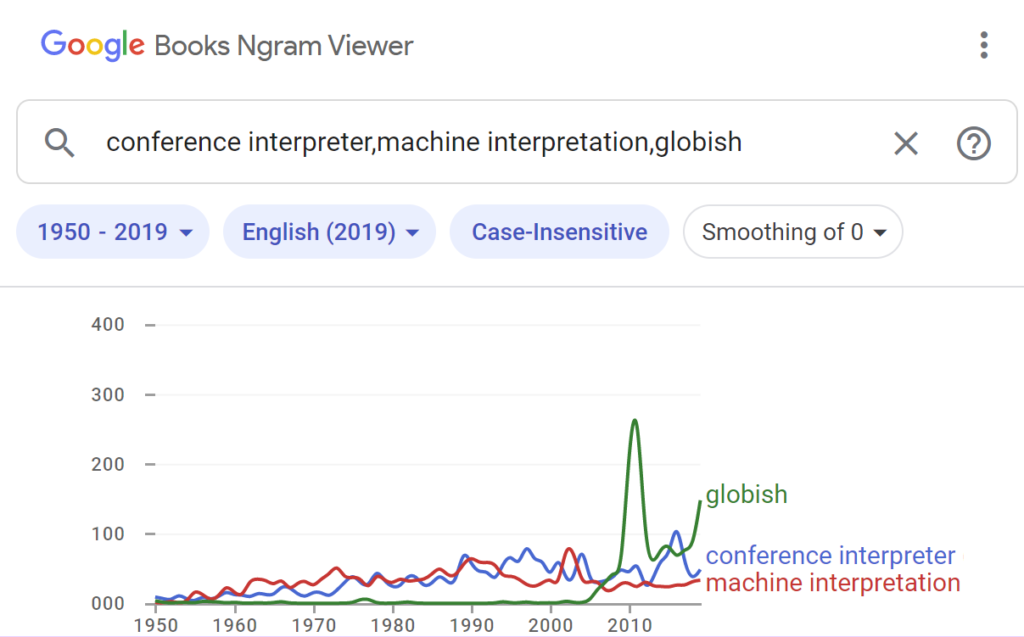
Source
So, it’s a thing, but is it a threat?
Let’s google “artificial intelligence threat to interpreters” and focus on the People-also-ask section:
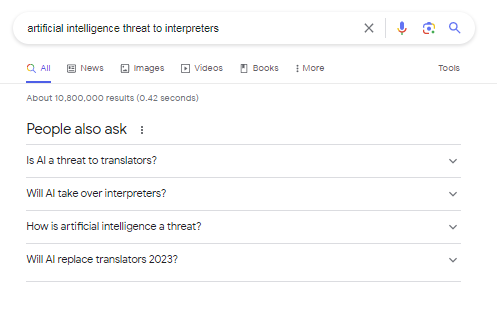
Let’s fine-tune our search exclude translators from our search: “artificial intelligence threat to interpreters -translators”
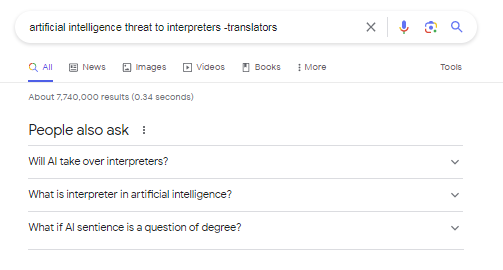
So the questions remains: Will AI take over interpreters?
Well, quite a few of the first-page results are actually kind of upbeat: despite the first one using words related to threats, others focus what can be learned, best practices. Fittingly, the position of AIIC Britain & Ireland on the issue makes it to the front page, and refers to AI as “not the greatest threat to the[..] profession”.
Selected google search results (don’t click, it’s an image)
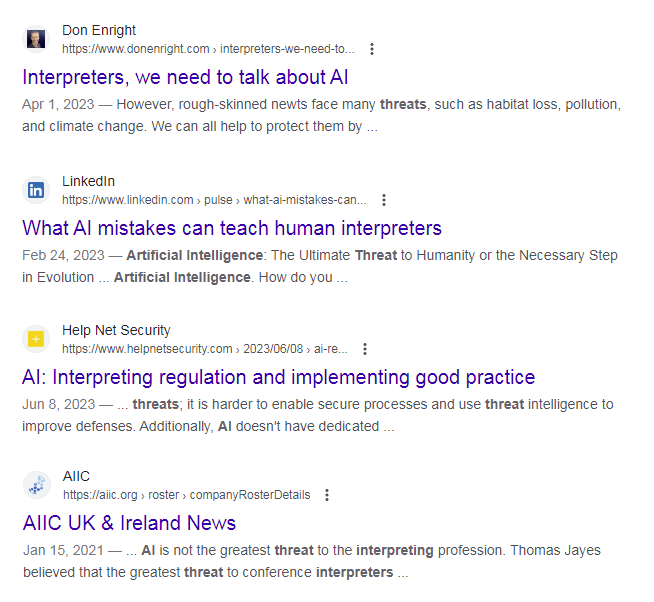
That last link about “threat to the profession” is interesting, let’s look at it in more detail.
What did AIIC UK& Ireland conclude?

Its Jan 15, 2021 closing webinar on “Artificial Intelligence and the Interpreter stated the panellists were unanimous in believing that AI is not the greatest threat to the interpreting profession. One believed the greatest threat to conference interpreters continues to be “no interpretation”, another believed the greatest threat to the profession is the commoditisation of conference interpreters.
They also pointed to a dynamic landscape, as “remote interpreting had previously been seen as a huge threat to conference interpreters, but is now perceived as a lifeline. “
That was two years ago, let’s update our search results
In particular, what or how is artificial intelligence based interpretation. The results have been curated and grouped together by topic to paint as wide a picture as possible.
What is AI-interpretation?
Let’s look at some curated google results
Eloy R González: Centre for Translation Studies (UoS)
3 days ago — … AI in interpreter-mediated environments … automatic speech recognition (ASR) for interpreters … Natural Language Processing
Event Live Captioning
Feb 7, 2023 —… barrier-free access … spoken word output directly, in real time, as subtitles in the original or instantly translated into any of 32 languages
Kudo | Patent Granted For Ai Speech Translation Method
Aug 8, 2023 — … integrates state-of-the-art Natural Language speech recognition and speech synthesis systems …
American Sign Language & Machine Captioning
Jan 12, 2023 — …. automatic AI captioning …. computer-generated captioning) … Live captioning available on request
Li Seminar In Research On Conference Interpreting
Sep 22, 2023 — impact of AI on interpreting ….Multimodality in Conference Interpreting Studies…. augmented interpreter…,
So, it seems the consensual definition of AI interpreting would be to process “Natural Language” in three automated stages: recognition, ‘translation’ per se, and production.
The science of translation interpretation
Natural language processing (NLP) is an interdisciplinary subfield of computer science and linguistics. It is primarily concerned with giving computers the ability to support and manipulate human language. The goal is a computer capable of “understanding” the contents of documents, including the contextual nuances of the language within them. Challenges in natural language processing frequently involve speech recognition, natural-language understanding, and natural-language generation. source
Live captioning is not strictly speaking interpretation, as it does not involve speech generation, but given the solid progress made in the first two stages, (recognition and ‘translation’), fully automated live captioning is emerging as an off-the-shelf, plug-and-play alternative to interpreting.
How does AI interpreters compare to human interpretation?
Let’s see what google tells us (curated results)
Machine Vs Human … And The Winner Is…
Chartered Institute of Linguists
Aug 31, 2023 — By Diana Singureanu in response to WIRED’s Pro Interpreters vs AI Challenge … impressive with jargon …. no logical pauses … impressive level of completeness
EST Evaluating: AR assisted interpretation
May 24, 2023 — When we tested AR glasses in a small study with professional conference interpreters, though, we were quickly brought down to earth. … AI in Computer-Assisted …
AI Interpretation evaluation (1 & 2)
(1) Sep 1, 2023 — … the current AI is still very monotonous
(2) Oct 18, 2023 — … humans recognize mechanical patterns and decide to stop listening
It certainly seems the second part of the process, the ‘translate’ stage, works quite well, and you can judge for yourself with the video of WIRED’s AI vs human interpreters challenge. The good coverage of jargon implies speech recognition works well. However, the production stage needs further refinement, as it is still offputting.
What do interpreters themselves think?
There is no such thing as “The Future of Interpreting”
Oct 23, 2023 — Interpreters won’t be replaced by AI; they will be replaced by interpreters who know how to use AI. …
The Future For Conference Interpreters Depends on…
Sep 21, 2023 — working language pairs, expertise, rates, location, experience, quality, dumping tendencies, marketing & IT, then market knowledge, then AI.
Are you tired of hearing technology will replace interpreters?
Oct 26, 2023 — … refocus on how AI will let us be more productive, creative, safe, eco-friendly, selective of the work we accept, and bring a higher standard of living
Translation professions doomed by artificial intelligence, really?
Apr 20, 2023 — ….international conferences are often very solemn occasions with major political and diplomatic implications …
Professionals seem rather upbeat, either prioritizing other threats to employment as more important, looking to harness the power of AI in support of their own professional performance, or pointing out the limits of current AI which means it cannot be used to replace humans in ‘solemn’ events.
I personally agree with the points made. AI can be used to improve our performance, and cannot replace humans in policy-making events, but I imagine ‘live captioning’ will find a niche in online semi-formal and business events, as it already provides a cheap, relatively effective, and quite ‘palatable’ solution that people are used to from reading captions on dubbed films.
Conclusion
The long term trend of rising globish and the recent explosion of AI are both threat and opportunities. After all, if globish uses only 1500 words, it simplifies our own recognition and leaves us to focus more on generation. Further more, big data tools allow us to identify the x most-frequently-used words in a given fields to better compete with AI at the ‘translation’ stage and better serve our audiences.
However, outside interpretation, AI is now providing written human translators serious competition on price, and less than a year after ChatGpt’s release (Nov 30, 2022), has already driven prices per word down in many markets, especially for the main European languages.
Google translate was launched in April 2006, and machine translation is now competitive, in price and quality, with some (not all) humans in some (not all fields), How long until ‘machine interpretation’ reaches the same threshold?
If we are to compose with AI language services, it makes sense for interpreters to specialise in their fields, but also focus on market awareness to identify emerging trends (live captioning) as well a new products (tailored content) and new language services beyond interpretation such as teaching (globish), training (communication skills) and (executive) coaching.

